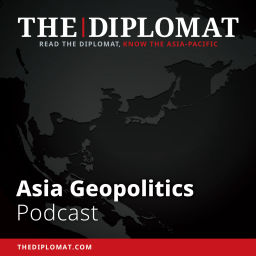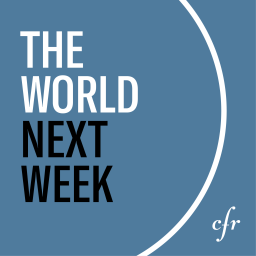
by CSIS | Center for Strategic and International Studies
A podcast unpacking critical issues underpinning China’s emergence as a global power.
Language
🇺🇲
Publishing Since
11/20/2017
Email Addresses
1 available
Phone Numbers
0 available

April 17, 2025
In this episode of the ChinaPower Podcast, Dr. Scott Kennedy joins us to discuss the recent escalation in tariffs between the U.S. and China. Dr. Kennedy starts with laying out the current situation, as it was on April 14th when the podcast was recorded, with the Trump administration placing 145% tariffs on China and China retaliating with roughly 125 % tariffs on the United States. Dr. Kenney notes that this level of escalation is not what many experts expected and explains that many in China believe that the U.S. is using the tariffs to drive the U.S. and China into economic war and to confront and isolate China on all dimensions. Further, he explains that during the first Trump administration, tariffs were used mainly as a negotiation tool, yet in Trump’s second term, it seems tariffs are being used in an attempt to remake the global economic architecture. Dr. Kennedy believes that the tariffs are working to boost China’s international image and the current turbulence in U.S. domestic politics has worked to change domestic opinion in China on the United States. At the same time, China is trying to cast itself as a more predictable international actor. Dr. Kennedy believes that at some point, there will be a deal between the U.S. and China that will lower or remove the reciprocal tariffs. However, this deal will likely be superficial and will not address the key problems in this bilateral relationship. Dr. Scott Kennedy is senior adviser and trustee chair in Chinese Business and Economics at the Center for Strategic and International Studies (CSIS). A leading authority on Chinese economic policy and U.S.-China commercial relations, Dr. Kennedy has been traveling to China for 37 years. His ongoing areas of focus include China’s innovation drive, Chinese industrial policy, U.S.-China relations, and global economic governance. His articles have appeared in a wide array of policy, popular, and academic venues, including the New York Times, the Wall Street Journal, Foreign Affairs, Foreign Policy, and China Quarterly. Dr. Kennedy hosts the China Field Notes podcast, which features voices from on the ground in China. From 2000 to 2014, Dr. Kennedy was a professor at Indiana University (IU), where he established the Research Center for Chinese Politics and Business and was the founding academic director of IU’s China Office. Dr. Kennedy received a PhD in political science from George Washington University, an MA from Johns Hopkins School of Advanced International Studies, and a BA from the University of Virginia.

March 27, 2025
In this episode of the ChinaPower Podcast, Dr. Jeffrey Ding joins us to discuss U.S.-China artificial intelligence (AI) competition and his book, Technology and the Rise of Great Powers: How Diffusion Shapes Economic Competition. Dr. Ding describes the framework he uses to understand the competition between the US and China on AI and explains that while many assume leading a technological competition comes from developing the next breakthrough invention, it should actually be centered around the diffusion of these technologies throughout their population of users. Technological leadership, therefore, depends on which country can best transfer and spread innovation from its top firms to the entire economy more effectively. Dr. Ding notes that China prioritizes an innovation-centric approach while neglecting broad-based technical and STEM education. He finds that the United States is better positioned than China to adopt and diffuse AI across a broad spectrum of sectors, given that more U.S. training institutions meet a quality baseline compared to China’s. Dr. Ding advises that since the United States is better positioned to diffuse AI technologies throughout its economy, it should focus on “running fast” rather than restricting China’s access to advanced technologies. Finally, Dr. Ding recommends that Washington focus on education policy, widening the base of AI engineers by increasing training sites, supporting public-private partnerships, and helping SMEs develop their AI capabilities. Dr. Jeffrey Ding is an Assistant Professor of Political Science at George Washington University, and the author of Technology and the Rise of Great Power: How Diffusion Shapes Economic Competition. Previously, he was a postdoctoral fellow at Stanford's Center for International Security and Cooperation, sponsored by Stanford's Institute for Human-Centered Artificial Intelligence. His research has been published or is forthcoming at European Journal of International Security, Foreign Affairs, Review of International Political Economy, and Security Studies, and his work has been cited in The Washington Post, The Financial Times, and other outlets. He also writes a weekly "ChinAI" newsletter, which features translations of Chinese conversations about AI development, to 12,000+ subscribers including the field's leading policymakers, scholars, and journalists. Dr. Ding holds a Ph.D in international relations from Oxford University, where he studied as a Rhodes scholar.

March 13, 2025
In this episode of the ChinaPower Podcast, Dr. Joel Wuthnow and Dr. Phil Saunders join us to discuss their new book on the People’s Liberation Army (PLA): “China’s Quest for Military Supremacy.” They begin by explaining the motivations behind their book and the growing demand for a comprehensive resource on the PLA among students, policymakers, and defense practitioners. Dr. Wuthnow then outlines how the PLA has entered a “new era” under Xi Jinping, characterized by greater confidence, structural reforms, and an expanding operational reach. Dr. Saunders then highlights how the PLA is increasingly being used to shape the Indo-Pacific region, citing China’s recent live-fire exercises near Australia and New Zealand as an example of its more assertive posture. Both experts also delve into key challenges facing the PLA, from Xi Jinping’s efforts to tighten party control to persistent corruption and political reliability issues. They also assess how the PLA’s rigid command structure and political indoctrination could undermine effectiveness in a crisis. Finally, the two experts assess the PLA’s progress becoming more joint, its nuclear modernization efforts, and the broader implications for U.S. and regional security. They conclude by discussing their views on how a second Trump administration could impact PLA behavior and China's strategic calculations. Dr. Joel Wuthnow is a senior research fellow in the Center for the Study of Chinese Military Affairs within the Institute for National Strategic Studies at NDU. His research areas include Chinese foreign and security policy, Chinese military affairs, U.S.-China relations, and strategic developments in East Asia. In addition to his duties in INSS, he also serves as an adjunct professor in the Edmund A. Walsh School of Foreign Service at Georgetown University. Dr. Phillip C. Saunders is Director of the INSS Center for the Study of Chinese Military Affairs. Dr. Saunders previously worked at the Monterey Institute of International Studies, where he served as Director of the East Asia Nonproliferation Program from 1999-2003. He also serves as an adjunct instructor at the School of Advanced International Studies at Johns Hopkins University.

Center for Strategic and International Studies

Center for Strategic and International Studies

CSIS | Center for Strategic and International Studies

The Diplomat

Kaiser Kuo

Foreign Affairs Magazine

Council on Foreign Relations

The Spectator

Hudson Institute

Center for Strategic and International Studies

The German Marshall Fund

War on the Rocks

Council on Foreign Relations

Foreign Policy
Pod Engine is not affiliated with, endorsed by, or officially connected with any of the podcasts displayed on this platform. We operate independently as a podcast discovery and analytics service.
All podcast artwork, thumbnails, and content displayed on this page are the property of their respective owners and are protected by applicable copyright laws. This includes, but is not limited to, podcast cover art, episode artwork, show descriptions, episode titles, transcripts, audio snippets, and any other content originating from the podcast creators or their licensors.
We display this content under fair use principles and/or implied license for the purpose of podcast discovery, information, and commentary. We make no claim of ownership over any podcast content, artwork, or related materials shown on this platform. All trademarks, service marks, and trade names are the property of their respective owners.
While we strive to ensure all content usage is properly authorized, if you are a rights holder and believe your content is being used inappropriately or without proper authorization, please contact us immediately at [email protected] for prompt review and appropriate action, which may include content removal or proper attribution.
By accessing and using this platform, you acknowledge and agree to respect all applicable copyright laws and intellectual property rights of content owners. Any unauthorized reproduction, distribution, or commercial use of the content displayed on this platform is strictly prohibited.